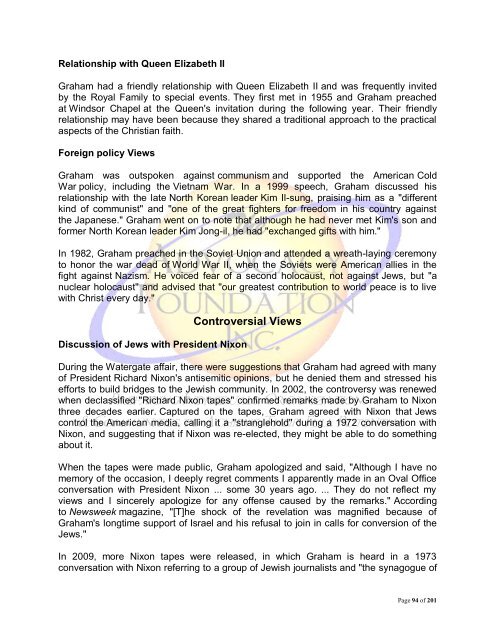You also want an ePaper? Increase the reach of your titles
YUMPU automatically turns print PDFs into web optimized ePapers that Google loves.
Relationship with Queen Elizabeth II<br />
Graham had a friendly relationship with Queen Elizabeth II and was frequently invited<br />
by the Royal Family to special events. <strong>The</strong>y first met in 1955 and Graham preached<br />
at Windsor Chapel at the Queen's invitation during the following year. <strong>The</strong>ir friendly<br />
relationship may have been because they shared a traditional approach to the practical<br />
aspects <strong>of</strong> the Christian faith.<br />
Foreign policy Views<br />
Graham was outspoken against communism and supported the American Cold<br />
War policy, including the Vietnam War. In a 1999 speech, Graham discussed his<br />
relationship with the late North Korean leader Kim Il-sung, praising him as a "different<br />
kind <strong>of</strong> communist" and "one <strong>of</strong> the great fighters for freedom in his country against<br />
the Japanese." Graham went on to note that although he had never met Kim's son and<br />
former North Korean leader Kim Jong-il, he had "exchanged gifts with him."<br />
In 1982, Graham preached in the Soviet Union and attended a wreath-laying ceremony<br />
to honor the war dead <strong>of</strong> World War II, when the Soviets were American allies in the<br />
fight against Nazism. He voiced fear <strong>of</strong> a second holocaust, not against Jews, but "a<br />
nuclear holocaust" and advised that "our greatest contribution to world peace is to live<br />
with Christ every day."<br />
Discussion <strong>of</strong> Jews with President Nixon<br />
Controversial Views<br />
During the Watergate affair, there were suggestions that Graham had agreed with many<br />
<strong>of</strong> President Richard Nixon's antisemitic opinions, but he denied them and stressed his<br />
efforts to build bridges to the Jewish community. In 2002, the controversy was renewed<br />
when declassified "Richard Nixon tapes" confirmed remarks made by Graham to Nixon<br />
three decades earlier. Captured on the tapes, Graham agreed with Nixon that Jews<br />
control the American media, calling it a "stranglehold" during a 1972 conversation with<br />
Nixon, and suggesting that if Nixon was re-elected, they might be able to do something<br />
about it.<br />
When the tapes were made public, Graham apologized and said, "Although I have no<br />
memory <strong>of</strong> the occasion, I deeply regret comments I apparently made in an Oval Office<br />
conversation with President Nixon ... some 30 years ago. ... <strong>The</strong>y do not reflect my<br />
views and I sincerely apologize for any <strong>of</strong>fense caused by the remarks." According<br />
to Newsweek magazine, "[T]he shock <strong>of</strong> the revelation was magnified because <strong>of</strong><br />
Graham's longtime support <strong>of</strong> Israel and his refusal to join in calls for conversion <strong>of</strong> the<br />
Jews."<br />
In 2009, more Nixon tapes were released, in which Graham is heard in a 1973<br />
conversation with Nixon referring to a group <strong>of</strong> Jewish journalists and "the synagogue <strong>of</strong><br />
Page 94 <strong>of</strong> 201

















